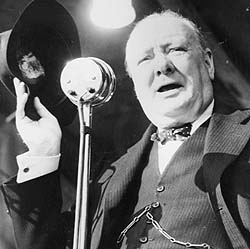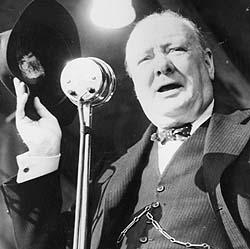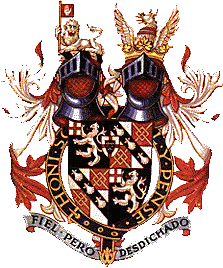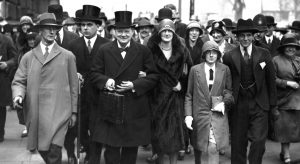
Reference
Churchill’s Elections

October 14, 2008
Douglas J. Hall
Published in Finest Hour 103
pp. 49-50
In a parliamentary career spanning sixty-four years Churchill represented five constituencies and served under thirteen Prime Ministers (Lord Salisbury, Balfour, Campbell-Bannerman, Asquith, Lloyd George, Bonar Law, Baldwin, MacDonald, Chamberlain, Attlee, Eden, Macmillan and Douglas-Home) -and, of course, his own Premierships, 1940-45 and 1951-55.
 Churchill from the beginning invariably addressed national rather than local issues. Oldham (for which he sat in 1900-06) was an important cotton-spinning centre whose electorate favoured the Conservative policy of Protectionism, which advocated duties on cheap foreign textiles. Churchill’s Free Trader stance and consequent defection to the Liberals was based on national rather than local considerations, but as a result the Oldham Conservative Association passed a resolution that he “had forfeited their confidence in him.”
Churchill from the beginning invariably addressed national rather than local issues. Oldham (for which he sat in 1900-06) was an important cotton-spinning centre whose electorate favoured the Conservative policy of Protectionism, which advocated duties on cheap foreign textiles. Churchill’s Free Trader stance and consequent defection to the Liberals was based on national rather than local considerations, but as a result the Oldham Conservative Association passed a resolution that he “had forfeited their confidence in him.”
Following his deselection at Oldham, Churchill was invited to stand for North West Manchester, one of nine of that city’s constituencies, with a tiny electorate of just 10,000, of whom almost a third were Jewish. Churchill polled 5,639 votes with a majority of 1,241. He represented the constituency for just over two years. By now a junior minister (Under Secretary of State for the Colonies), he was almost entirely concerned with national and international affairs. The Liberal government brought in an Aliens Act which angered the powerful Jewish element in Churchill’s constituency, and local Catholics were incensed because he would not commit himself over Home Rule for Ireland. When, in the custom of the day, he had to submit to reelection on being appointed to the Cabinet as President of the Board of Trade, he was narrowly defeated by the Tory candidate.

2025 International Churchill Conference
Just two weeks later Churchill found a “seat of convenience” at Dundee. He polled 7,079 votes while the Conservative and Labour candidates split 8,384 votes between them. He remained MP for Dundee for over fourteen years, during which time he was almost continuously a Cabinet minister.
Churchill initially saw Dundee as “a seat for life,” but suffered the inconvenience of its being 440 miles from Westminster and, in those days, only practically accessible by a rather joyless overnight sleeper train from King’s Cross. Scotland’s third largest city, Dundee was hardly a joyful place in which to arrive of a morning, dark, tall and grimy, with much unemployment, poverty and drunkenness. Curiously, the electorate at first felt honoured to be represented by a Cabinet minister and seemed prepared to overlook Churchill’s long absences. But the relationship became strained after World War 1, when Churchill’s own controversial escapades compounded with much local bitterness and disillusionment led to his defeat in the 1922 election. Shortly before polling day Churchill had been stricken with appendicitis, which limited his campaigning. He finished fourth behind a Prohibitionist, a Labourite and a local Liberal, and later wrote: “I found myself without an office, without a seat, without a party and without an appendix.”
Churchill was out of Parliament for almost two years, unsuccessfully contesting by-elections at Leicester West and Westminster in 1923-24. In the 1924 general election he was adopted as the “Independent Constitutionalist anti-Socialist” candidate for Epping, which effectively remained his constituency for the rest of his political career.
In his five years as Chancellor of the Exchequer Churchill was engrossed in national issues: the General Strike; pensions for widows, orphans and the elderly; taxes and the Gold Standard; unemployment and the Depression. Constituency concerns received scant attention. Churchill’s visits were mainly whistle-stop tours and an occasional summer fete. Nevertheless, in that “semirural constituency among the glades of Epping Forest,” the voters seemed content with their MP’s high profile, and prepared to overlook his limited parochial presence. He was popular, respected, even regarded as something of a Colossus.
The May 1929 election swept the Tories from office and Churchill’s majority was slashed to 5,000, his smallest ever for Epping/Woodford. Through 1939 he was out of office, increasingly isolated from his party, first over Dominion status for India, then over rearmament. In the 1935 election he faced considerable hostility at several meetings but polled almost 35,000 votes and recorded his largest majority (20,419). During its record run (1935-45), the new Parliament saw Churchill return triumphantly to the centre of affairs, but not before he had ruffled constituency feathers with his attacks on
Chamberlain’s policy of appeasement. Several constituency branches passed resolutions of censure and Churchill later regarded the episode as “one of the major political crises” he had faced in his career.
In 1945 Epping was subdivided. The new Epping Division looked marginal (in fact it was won by Labour) so Churchill stood for the new Woodford Division. He won by a majority of over 17,000, but nationally Labour won 393 seats to only 189 for the Tories.
Churchill now became Leader of the Opposition. During the election of February 1950, he polled more than 37,000 votes, double that of his challenger. Nationally the Attlee majority was reduced to six. This was not enough to sustain a radical programme and when Attlee called another election in 1951 the Conservatives won 321 seats to Labour’s 295. Churchill returned to Downing Street with a personal record: 40,938 votes.
Woodford sent him back again in 1955, despite some rumblings that he was now eighty, and no longer Prime Minister. His vote (25,069) was the lowest since 1929, though there had been some population decreases and he did retain a huge majority. Once more he won in 1959—by nearly 15,000 votes. Churchill served as MP until October 1964, although age and infirmity limited his appearances both in Commons and in Woodford. When he finally resigned he was nearly ninety. The electors of Woodford had clearly, in Burke’s phrase, “chosen a member indeed.” Mainly they remained unperturbed by his age. They were represented by a legend.
All the Elections Churchill Contested
Compiled by, Ronald I. Cohen
Churchill contested twenty-one elections over sixty years, winning sixteen and losing five. In early elections, polling was spread over some weeks; my dates are the polling dates for Churchill’s own constituencies. His first victory, in Oldham in 1900, was as one of a two-member constituency.
Churchill almost always ran second when he lost, sometimes a close second-the only exception being 1922 in Dundee when, damaged politically and suffering from appendicitis, he finished fourth among six candidates and found himself “without an office, without a seat, without a party, and without an appendix.” (“Election Memories,” Strand Magazine, September 1931, reprinted in Thoughts and Adventures, 1932.)
Note on 1945: Churchill himself was handily re-elected in his constituency, which became Woodford after his old Epping constituency was subdivided. But his party was routed and Clement Attlee became Prime Minister. Exceptionally, because time was needed to count votes from armed forces abroad, the 1945 results were not announced until 26 July, three weeks after Polling Day.
By-elections (or “bye-elections”) are held when a Member of Parliament dies or is otherwise unable to serve out a term. Early in the century, an MP was required to stand in a by-election when appointed to Cabinet office. In 1908 Churchill was appointed President of the Board of Trade: losing his seat in the Manchester by-election, he was quickly elected MP for Dundee, then a Liberal Party stronghold.
Date: Result, Nature of Contest, Constituency
6 Jul 1899: Lost, By-election, Oldham
1 Oct 1900: Won, Election, Oldham
13 Jan 1906: Won, Election, NW Manchester
24 Apr 1908: Lost, By-election, NW Manchester
9 May 1908: Won, By-election, Dundee
22 Jan 1910: Won, Election, Dundee
8 Dec 1910: Won, Election, Dundee
30 Jul 1917: Won, By-election, Dundee
14 Dec 1918: Won, Election, Dundee
15 Nov 1922: Lost, Election, Dundee
6 Dec 1923: Lost, Election, W Leicester
19 Mar 1924: Lost, By-election, Westminster, Abbey
29 Oct 1924: Won, Election, Epping
30 May 1929: Won, Election, Epping
27 Oct 1931: Won, Election, Epping
14 Nov 1935: Won, Election, Epping
5 Jul 1945: Won, Election, Woodford
23 Feb 1950: Won, Election, Woodford
25 Oct 1951: Won, Election, Woodford
Subscribe
WANT MORE?
Get the Churchill Bulletin delivered to your inbox once a month.





